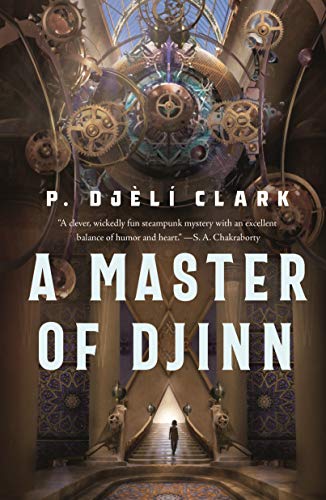It's 1912 and Alistair Worthington, a rich English businessman living in Cairo is the head of the Hermetic Brotherhood of Al-Jahiz, a secret society of his own creation. When the entire society is murdered in spectacular fashion in Lord Worthington's home, each member's flesh burned but their clothing untouched by the flames, it is clear that something supernatural is involved. Fatma el-Sha'arawi, the youngest agent and one of the few women in the Ministry of Alchemy, Enchantments, and Supernatural Entities, is called in to investigate the sinister happening. It isn't hard for Fatma and her new partner Hadia, a young woman assigned to her by the Ministry who Fatma accepts reluctantly, to discover who committed the murders but stopping the man in the gold mask, a man who claims he is the revered al-Jahiz returned, a man who can command the most terrifying of djinn, a man who is holding rallies in the poorest sections of town to profess his intention to address the enormous social inequalities of this world, a man who is capable, at every turn, of besting Fatma and her girlfriend Siti who seems to possess a certain magic of her own, a man who is bent on the destruction of the Ministry, Cairo, and this world, will be much harder.
The world that Clark has built here is indeed magical and fantastical and even those who have not read the previous novellas set in this same world (me!) will appreciate the detail about the world and the way it works here. Fatma is a quirky character, with her sharp sartorial sense--each of her suits lovingly described--and her curmudgeonly response to being assigned eager, new agent Hadia as a partner. She says that the reappearance of Siti in her bed has muddled her a bit but without her somewhat mysterious girlfriend and Siti's contacts, Fatma herself, as sharp and as smart as she is supposed to be, would make zero progress on the case. And it does seem as if there is a lot of running from pillar to pole to add more plot elements. Perhaps this is because Clark normally writes in shorter form but occasionally this feels quite forced. For instance, the man in the gold mask has no need of the rallies to win over the Cairenes given his ultimate goal but without the rallies, Fatma would never track him down. The political bickering at a peace conference felt inserted simply to remind the reader that Europe is in the run up to WWI rather than serving this particular story. And the unmasking in the end is completely, and perhaps intentionally, predictable. Despite this, Clark's novel was ultimately an engrossing story, filled with piquant commentary on anti-colonialism, racism, misogyny, mentorship, and relationship. It has convinced me to keep a more open mind toward the genre for sure.
Thanks to the publisher for sending me a copy of this book for review.







No comments:
Post a Comment
I have had to disable the anonymous comment option to cut down on the spam and I apologize to those of you for whom this makes commenting a chore. I hope you'll still opt to leave me your thoughts. I love to hear what you think, especially so I know I'm not just whistling into the wind here at my computer.